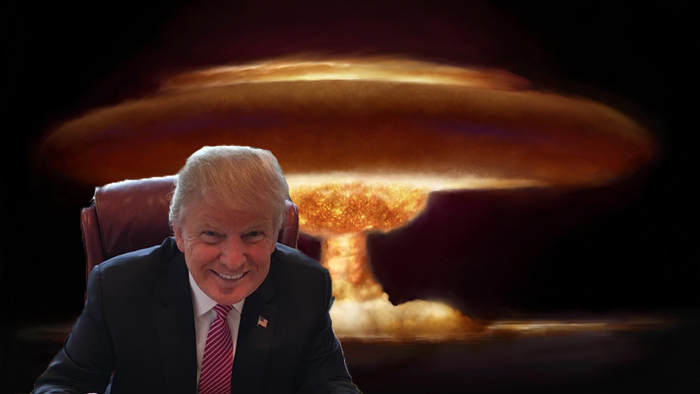In this month after becoming president, Donald Trump has conducted a series of phone calls to various heads of state. These calls are not ceremonial. In the case of Russia and the People’s Republic of China, President Trump must be able to converse directly with President Putin and President Xi. Not just because they run large countries that we have deemed superpowers, but because they possess nuclear weapons aimed at the citizens of the United States and with the capability of destroying our republic. The subject of nuclear weapons does not even need to be raised. Nuclear weapons are a permanent subtext in all superpower conversations.
This is made even more so since the United States does not possess a strategic ballistic missile defense capable of stopping Russian, Chinese, or Iranian ballistic missiles or the nuclear blackmail such weapons afford. The recent test of the advanced Chinese DF-5C missile and the Iranian missile test was a stark reminder for President Trump that the potential for thermonuclear war still exists. That the United States is in this strategically inferior and unenviable position is entirely unacceptable.
Americans will be shocked to learn that should a madman in Russia, China, Iran or elsewhere seek the nuclear destruction of the United States there is little an American president can do today except launch a retaliatory nuclear strike guaranteeing the Cold War policy of mutually assured destruction. There can be little satisfaction, however, in the mass slaughter of Russian, Chinese or Iranian subjects while American citizens would have suffered their own nuclear attack. The morality of MAD was always questionable. In a world where Iranian mullahs preach hatred of the United States and Israel while they continue their nuclear ambitions, it is absurd.
President Trump has pledged to build a national missile defense. Its strategic necessity is greater, if less well-understood, than the wall he will be building on our southern border. When completed, Trump will have done what no president, including Ronald Reagan, has done: ensure that the American people are not vulnerable to the strategic designs of a foreign power. Our freedom and our constitutional order cannot be guaranteed so long as a single command by a Russian or Chinese president or an Iranian mullah could mean the end of American civilization. It would be fair for President Trump to ask his generals how we have arrived in this position.
We know that the end of the Cold War brought a regrettable lack of seriousness to our strategic thinking. Although advanced forms of missile defense were within our technological ability, the reorganization of the Soviet Union removed all urgency. Successive U.S. administrations starting with George H.W. Bush treated missile defense as desirable but not a priority. After an explicit nuclear threat by the PRC in 1995, billions were spent on a limited, land-based system in Alaska that can stop a handful of North Korean missiles. Its main purpose, it would appear, was to give the illusion that we were defended.
Equally vexing, our paralysis continued despite the fact that U.S. intelligence knew the Russians had developed a primitive but effective missile defense of their own during the Cold War and that the Chinese were developing their own missile defenses to complement their growing nuclear arsenal.
Although one could register this failure to build missile defenses as mere incompetence, September 11 should have sharpened our strategic outlook. The world of Islamic terrorism had put the United States in its cross hairs. The 9/11 hijackers had been aided and abetted by Iranian intelligence, itself an act of war. With certainty, we knew that Iran was also building a nuclear capacity to match their advanced ballistic missiles. In this enterprise, the Iranians had the assistance of Russia, North Korea, and, by extension, Communist China. As we were constructing a homeland security super state, it would not have been crazy to include the building of a national missile defense using land, sea and space-based interceptors on the off chance that a future attack on America would be with nuclear missiles.
Underscoring this is the fact that the Iranians have practiced the launching of ballistic missiles from ships in the Caspian Sea. In such testing the Iranians simulated an Electro Magnetic Pulse attack that could, with the right nuclear warhead, destroy the electric infrastructure of the U.S. and, at its most severe, cause the deaths of hundreds of millions of Americans. The Iranian test on January 29th was of the same kind. The use of an EMP weapon is at the heart of Iranian strategic nuclear doctrine. It does not require thousands of nuclear warheads and missiles. It requires one highly advanced or several less advanced missiles. This latest test was, moreover, a message to President Trump that the Iranians are perfecting the means, and being aided by the world’s superpowers, to kill every last American man, woman and child. Subtle they are not.
For 15 years, our national security strategy has been consumed by war against Islamic terrorism including now ISIS. President Trump inherits a national security apparatus whose best minds have been preoccupied with irregular warfare, counterinsurgency strategy, democracy building and humanitarian exercises. Some of these were necessary for the task at hand. Others entirely misplaced. This has served, unfortunately, as a strategic distraction when it comes to the defense of our nation against nuclear ballistic missiles.
Leaving the United States vulnerable to the predations of our enemies, whoever that may be, is the height of immorality. We can defeat those enemies who mean us harm in the Islamic world whether it is ISIS or anyone else and build a national missile defense. President Trump is assembling the team now to fix this and make missile defense a reality. It can come none too soon.
Mr. Kennedy is President of the American Strategy Group and a member of the Independent Working Group on Missile Defense.

No comments:
Post a Comment